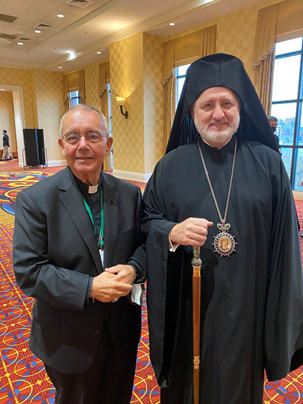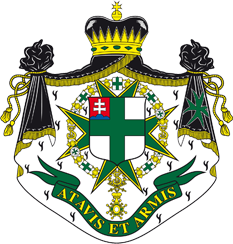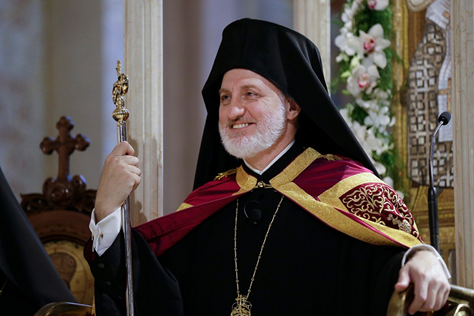Ortodoxný arcibiskup Elpidophoros mal historický prejav na Zhromaždení USCCB.
L’ARCIVESCOVO ORTODOSSO ELPIDOPHOROS FA UN DISCORSO STORICO ALL’ASSEMBLEA DELL’USCCB
(Sua Eminenza l’Arcvivescovo Elpidophoros)
Sua Eminenza l’Arcivescovo Elpidophoros, Presidente dell’Assemblea dei Vescovi ortodossi canonici degli Stati Uniti, ha parlato di un „dialogo d’amore“ tra le due fedi e del potenziale per una maggiore unità in un discorso storico all’Assemblea Generale d’Autunno della Conferenza dei Vescovi Cattolici degli Stati Uniti.
Elpidophoros ha detto di avere „una gioia sincera“ di essere con i suoi „fratelli vescovi della USCCB“ e che martedì 16 novembre ha segnato la prima volta nella storia degli Stati Uniti che la leadership ortodossa è stata presente all’assemblea generale della USCCB. Egli è stato raggiunto da diversi altri vescovi ortodossi che erano presenti come osservatori.
L’arcivescovo Jose Gomez, il presidente dell’USCCB, e il vescovo David Talley, presidente del comitato per gli affari ecumenici e interreligiosi, hanno organizzato la partecipazione della delegazione ortodossa all’assemblea. Gomez ha invitato Elpidophoros a parlare all’assemblea.
„Come ben sapete, alcune settimane fa abbiamo avuto l’onore e la benedizione di accogliere Sua Santità il Patriarca Ecumenico Bartolomeo per una visita storica in questo paese, durante la quale ha incontrato alcuni di voi a Washington, DC, o a New York City“, ha detto Elphidoros. Ha ringraziato i vescovi per la loro „calda ed ecumenica presenza“ con il patriarca.
Elphidoros ha citato il discorso del patriarca Bartolomeo al ricevimento ecumenico al Consiglio Nazionale delle Chiese, dove il patriarca ha dichiarato che un „dialogo d’amore“ tra le fedi è il futuro per le due chiese, e che il 21° secolo „dovrebbe diventare il secolo del ripristino dell’unità“.
„Oggi, sono convinto, mentre mi presento davanti ai miei fratelli gerarchi, che questo dialogo d’amore, iniziato da Papa Paolo VI e dal Patriarca Ecumenico Athenagoras nel 1964 a Gerusalemme, continua con una densità particolare in questo paese benedetto“, ha detto Elphidoros.
Questo „dialogo d’amore“ dovrebbe essere modellato dalla relazione di Papa Francesco e del Patriarca Bartolomeo, ha spiegato l’arcivescovo. Nel 2013, Bartolomeo è diventato il primo arcivescovo di Costantinopoli a partecipare a un’intronizzazione papale, e i due hanno lavorato insieme, insieme ad altri leader di fede, per discutere i migliori approcci su questioni sociali.
Questo dialogo tra cattolicesimo e ortodossia „è una chiara manifestazione del nostro comune desiderio di unità e comunione sia a livello globale che locale“, ha detto Elphidoros, e ha detto che la Consulta teologica ortodosso-cattolica nordamericana „non dovrebbe essere timida“ su ciò che ha realizzato nella sua esistenza.
„Dal 1965 – nella felice coincidenza del ristabilimento delle relazioni cattolico-ortodosse e del Concilio Vaticano II – questa Consulta ha prodotto trentadue documenti, rapporti e dichiarazioni“, ha detto. „Alcuni di essi sono diventati dei veri riferimenti per i teologi, e per le nostre Chiese per camminare insieme verso l’unità“.
Questi scritti, ha detto, sono i „veri frutti“ della collaborazione tra Ortodossia e Cattolicesimo, frutti che servono a „nutrire entrambe le nostre comunità“.
Oltre alle pubblicazioni, Elphidoros ha detto che il miglioramento delle relazioni tra le due fedi produce anche frutti spirituali.
„Ogni anno l’Assemblea dei Vescovi insieme alla USCCB offrono la preghiera di apertura alla Marcia per la Vita“, ha detto. „Solo pochi mesi fa, l’Assemblea dei Vescovi ha anche firmato un Amicus brief a sostegno della santità della vita“.
Guardando avanti, Elphidoros ha detto che i cristiani ortodossi sono „molto interessati“ al processo sinodale, in particolare al Sinodo dei vescovi cattolici dell’ottobre 2023, e sarebbero interessati a fornire un contributo all’inizio della preparazione del sinodo.
„Sono convinto che il futuro e la missione delle relazioni cattolico-ortodosse negli Stati Uniti è di continuare a testimoniare la presenza di Dio nel mondo, fedeli allo Spirito di Gerusalemme che abbiamo ricevuto in eredità“, ha detto.
„Il dialogo ecumenico porta in sé una dimensione sinodale che esplora il significato e la prassi della natura stessa della struttura e della missione della Chiesa“, ha detto Elphidoros, aggiungendo che, mentre il dialogo internazionale sta studiando l’interdipendenza tra sinodalità e primato, „forse, nel nostro contesto americano, se dedichiamo la nostra energia e il nostro tempo a condividere questa importante questione e a riflettere insieme, porterà frutto a tempo debito“.
Elphidoros ha chiuso il suo discorso ringraziando i vescovi, dicendo che spera che „ci saranno molte altre occasioni per unirsi come fratelli“.
Poi ha dato all’arcivescovo Gomez una croce pettorale d’argento di Hagia Sophia, „la cattedrale universale della cristianità“, come simbolo del suo „amore e apprezzamento“.
ORTHODOX ARCHBISHOP ELPIDOPHOROS MAKES HISTORIC ADDRESS TO USCCB ASSEMBLY

(His Excellency Archbishop Jose Gomez and His Eminence Archbishop Elpidophoros)
His Eminence Archbishop Elpidophoros, Chairman of the Assembly of Canonical Orthodox Bishops of the United States, spoke of a “dialogue of love” between the two faiths and the potential for increased unity in a historic address to the Fall General Assembly of the United States Conference of Catholic Bishops.
Elpidophoros said he had “heartfelt joy” being with his “brother bishops of the USCCB,” and that Tuesday, Nov. 16, marked the first time in the history of the United States that Orthodox leadership had been present at the USCCB’s general assembly. He was joined by several other Orthodox bishops who were present as observers.
Archbishop Jose Gomez, the president of the USCCB, and Bishop David Talley, chairman of the committee on ecumenical and interreligious affairs, arranged for the Orthodox delegation to join the assembly. Gomez invited Elpidophoros to address the assembly.
“As you are well aware, a few weeks ago we had the honor and blessing to welcome His All-Holiness Ecumenical Patriarch Bartholomew for a historic visit to this country during which he met some of you either in Washington, DC, or in New York City,” said Elphidoros. He thanked the bishops for their “warm and ecumencial presence” with the patriarch.
Elphidoros quoted Patriarch Bartholomew’s address to the Ecumenical Reception at the National Council of Churches, where the patriarch stated that a “dialogue of love” between the faiths was the future for the two churches, and that the 21st century “should become the century of the restoration of unity.”
“Today, I am convinced, as I present myself in front of my brother hierarchs, that this dialogue of love, initiated by Pope Paul VI and Ecumenical Patriarch Athenagoras in 1964 in Jerusalem, continues with a particular density in this blessed country,” said Elphidoros.
This “dialogue of love” should be modeled by the relationship of Pope Francis and Patriarch Bartholomew, explained the archbishop. In 2013, Bartholomew became the first Archbishop of Constantinople to attend a papal enthronement, and the two have worked together, along with other faith leaders, to discuss the best approaches on societal issues.
This dialogue between Catholicism and Orthodoxy “is a clear manifestation of our common desire for unity and communion on both a global and local level,” said Elphidoros, and he said that the North American Orthodox-Catholic Theological Consultation “should not be shy” about what it has accomplished in its existence.
“Since 1965 — at the happy coincidence of the reestablishment of Catholic-Orthodox relations and the Second Vatican Council — this Consultation has produced thirty-two documents, reports, and statements,” he said. “Some of them became real references for theologians, and for our Churches to walk together towards unity.”
These writings, he said, are the “real fruits” of the collaboration between Orthodoxy and Catholicism, fruits that serve to “nourish both our communities.”
In addition to the publications, Elphidoros said that the improving relationships between the two faiths produce spiritual fruits as well.
“Every year the Assembly of Bishops together with the USCCB offer the opening prayer at the March for Life,” he said. “Just a few months ago, the Assembly of Bishops also signed on to an Amicus brief supporting the sanctity of life.”
Looking ahead, Elphidoros said that the Orthodox Christians are “very interested” in the synodal process, particularly the October 2023 Catholic Synod of Bishops, and would be interested in providing input as the preparations for the synod begin.
“I am convinced that the future and mission of Catholic-Orthodox relations in the USA is to continue to bear witness to God’s presence in the world, faithful to the Spirit of Jerusalem that we received as a legacy,” he said.
“Ecumenical dialogue bears in itself a synodal dimension that explores the meaning and praxis of the very nature of the Church structure and mission,” said Elphidoros, adding that while international dialogue is studying the interdependence between synodality and primacy, “perhaps, in our American context, as we dedicate our energy and time to sharing this important issue and reflecting together, it will bear fruit in due course.”
UDALOSTI
- Grand Hospitaller Report 2023 27. júna 2024
- Podpora vzdelávacieho procesu na školách 7. júna 2024
- Investitúra 2024 25. mája 2024
- Pozvánka na investitúru 2024 17. mája 2024
- Charitatívna činnosť 15. mája 2024

 Military and Hospitaller Order of St.Lazarus of Jerusalem Grand Priory Slovakia,
Military and Hospitaller Order of St.Lazarus of Jerusalem Grand Priory Slovakia,